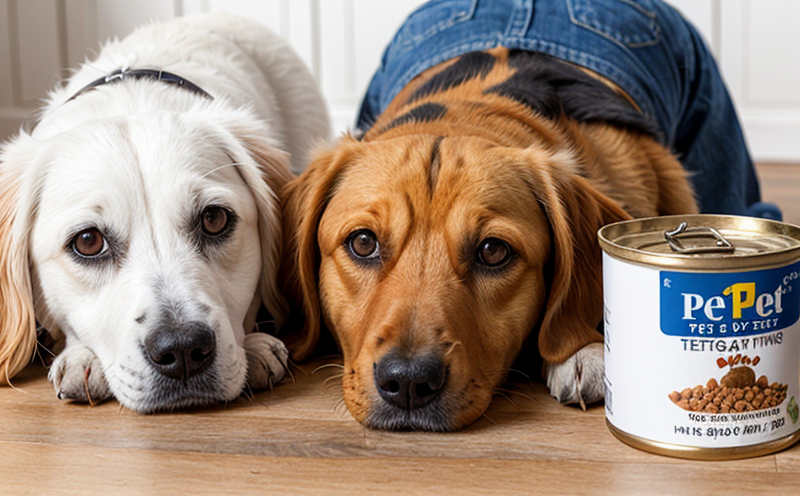ISO 44589 Omega-3 and Omega-6 Profiling in Pet Supplements
The demand for pet supplements rich in essential fatty acids, particularly omega-3 (EPA & DHA) and omega-6 (AA), is growing. These nutrients play a critical role in maintaining the overall health of pets by supporting skin and coat, joint function, immune system efficiency, and more.
The European Committee for Standardization (CEN) has developed ISO 44589, which specifies methods for determining the levels of omega-3 fatty acids EPA and DHA as well as omega-6 fatty acid AA in pet food supplements. This standard ensures that products meet specific nutritional requirements set by regulatory bodies like the European Food Safety Authority (EFSA).
At Eurolab, we offer comprehensive analysis services based on ISO 44589 to ensure that your pet supplement formulations are accurate and compliant with international standards. Our expertise in this area ensures precision and reliability.
The process involves several key steps: first, the sample preparation requires careful handling of the pet food supplements to maintain integrity and accuracy during analysis. Next is extraction, where solvents are used to separate the fatty acids from other components of the supplement. Following extraction, derivatization techniques may be applied before quantification using advanced chromatographic methods such as gas chromatography (GC) or liquid chromatography coupled with mass spectrometry (LC-MS).
Our team specializes in ensuring that these analyses are conducted under strictly controlled conditions to minimize any potential variability. This includes maintaining consistent temperature, humidity levels, and precise measurement techniques throughout the process.
The results of our ISO 44589 compliant analysis provide detailed information about the presence and concentration levels of omega-3 (EPA & DHA) and omega-6 (AA). These data points are crucial for understanding how well your product meets its intended nutritional profile. They also serve as valuable feedback for ongoing R&D efforts aimed at optimizing formulation composition.
By leveraging Eurolab’s state-of-the-art facilities and experienced personnel, you can rest assured that every aspect of your pet supplement testing adheres to the highest quality standards outlined by ISO 44589. This ensures not only regulatory compliance but also enhances consumer confidence in the efficacy and safety of your products.
Our commitment extends beyond mere analytical services; we work closely with our clients throughout the entire project lifecycle—from initial consultation through final report delivery—ensuring seamless integration into broader business strategies related to product development, quality assurance, or market expansion initiatives involving pet supplements.
Benefits
Compliance with international standards like ISO 44589 is essential for maintaining high-quality pet food supplement products. By offering these services, Eurolab helps manufacturers stay ahead of regulatory requirements while enhancing product quality and consumer trust.
Accurate profiling allows companies to ensure they are delivering the correct amount of omega-3 (EPA & DHA) and omega-6 (AA), which is vital for maintaining pet health. This precision supports better formulation decisions, leading to more effective products that meet specific dietary needs.
The use of advanced analytical techniques ensures consistent results across multiple batches or versions of the same product, reducing variability and improving batch-to-batch consistency. Consistency is critical in establishing brand reliability and ensuring customer satisfaction.
Moreover, compliance with such standards can facilitate easier entry into international markets where stringent regulations apply. It demonstrates a commitment to quality which can translate into increased market share and better reputation among pet owners.
For R&D teams within pet food companies, this service provides invaluable insights that drive innovation by identifying areas for improvement or potential new ingredients or combinations worth exploring further.
Eurolab Advantages
Our state-of-the-art laboratory facilities equipped with the latest technology enable precise and reliable analysis of omega-3 (EPA & DHA) and omega-6 (AA) in pet food supplements according to ISO 44589. Our experienced scientists bring extensive knowledge and expertise to every project, ensuring thorough understanding of both technical aspects and business implications.
We employ cutting-edge chromatographic methods, including gas chromatography (GC), liquid chromatography coupled with mass spectrometry (LC-MS), and other relevant techniques, tailored specifically for this type of analysis. These tools allow us to achieve high sensitivity and specificity needed when working with trace amounts of fatty acids present in pet food supplements.
Our commitment to quality is reflected not only in our methodologies but also through rigorous internal controls implemented throughout the analytical process—from sample receipt through final reporting. This guarantees that all results are accurate, reproducible, and transparently documented.
In addition, we offer personalized support tailored specifically to your needs, whether you require basic compliance checks or deeper dive into specific aspects of your product development cycle. Our goal is always to provide actionable insights that contribute directly towards achieving your business objectives related to pet supplements.
Customer Impact and Satisfaction
Partnering with Eurolab for ISO 44589 compliant omega-3 (EPA & DHA) and omega-6 (AA) profiling offers numerous benefits that positively impact customers across various dimensions:
Enhanced Product Quality: By ensuring accurate determination of essential fatty acids according to international standards, we help maintain consistent product quality. This consistency builds trust among consumers who value reliability when it comes to pet health products.
Informed Decision-Making: Accurate profiling provides manufacturers with valuable data necessary for informed decision making during the R&D process. It allows them to refine formulas based on real-world performance metrics rather than assumptions or guesswork.
Regulatory Compliance: Meeting strict regulatory requirements is paramount in today’s highly regulated environment. Eurolab ensures that all analyses are conducted in accordance with ISO 44589, thereby reducing the risk of non-compliance penalties and reputational damage.
Market Access: Demonstrating compliance to international standards opens doors to new markets where stringent regulations exist. This can significantly expand your customer base while maintaining brand integrity.
Customer Trust & Satisfaction: Consistent, high-quality products backed by reliable data increase customer satisfaction and loyalty. Positive reviews from satisfied customers further reinforce the positive impact of partnering with Eurolab for your omega-3 (EPA & DHA) and omega-6 (AA) profiling needs.





